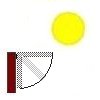Basic math time. We have
1) 5.5 cubic foot chest freezer converted into a fridge. Kill-A-Watt shows 264 watts a day or 11 watts/hour (the temperature regulator turns the 'fridge' on an off and we've been monitoring the temp with a wireless thermometer. Our current AC voltage is 123. Watts when off are of course 0 and when the compressor is on around 120 watts but only for a few minutes.
2) 16 cubic foot upright chest freezer. It uses 1248 watts over a 24 hr period or 53 watts per hour. The watts vary from .3 constant to sometimes 100 watts while the compressor is running
I have an Ecoflow Delta 1300 and 2 x 100 Renogy Briefcase panels. For emergency power backup for just the 'fridge' and freezer I am guessing 10-12 hrs if fully charged and without the solar. The solar panels we have not tested yet but I am thinking with a good 4 hrs sun I can get another 6 hrs of freezer /ridge hrs? To be safe we're planning on estimating 12 hrs.
If the power outage is not widespread, we could always take the Ecoflow to a neighbor and recharge it there and bring it back. The biggest drawback with the Ecoflow is the 2 hr cool down and 2 hr recharge period = 4 hrs which might be pushing the fridge a bit. We have not yet tested how long the fridge can maintain its temp without power.
Any other tips/thoughts?
1) 5.5 cubic foot chest freezer converted into a fridge. Kill-A-Watt shows 264 watts a day or 11 watts/hour (the temperature regulator turns the 'fridge' on an off and we've been monitoring the temp with a wireless thermometer. Our current AC voltage is 123. Watts when off are of course 0 and when the compressor is on around 120 watts but only for a few minutes.
2) 16 cubic foot upright chest freezer. It uses 1248 watts over a 24 hr period or 53 watts per hour. The watts vary from .3 constant to sometimes 100 watts while the compressor is running
I have an Ecoflow Delta 1300 and 2 x 100 Renogy Briefcase panels. For emergency power backup for just the 'fridge' and freezer I am guessing 10-12 hrs if fully charged and without the solar. The solar panels we have not tested yet but I am thinking with a good 4 hrs sun I can get another 6 hrs of freezer /ridge hrs? To be safe we're planning on estimating 12 hrs.
If the power outage is not widespread, we could always take the Ecoflow to a neighbor and recharge it there and bring it back. The biggest drawback with the Ecoflow is the 2 hr cool down and 2 hr recharge period = 4 hrs which might be pushing the fridge a bit. We have not yet tested how long the fridge can maintain its temp without power.
Any other tips/thoughts?



